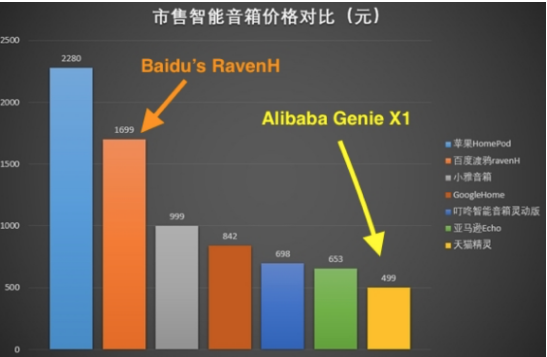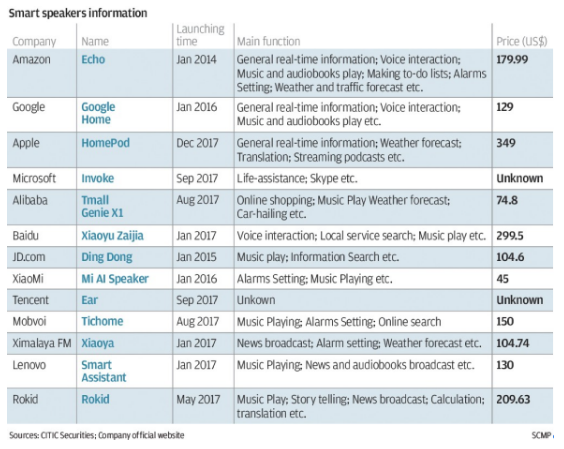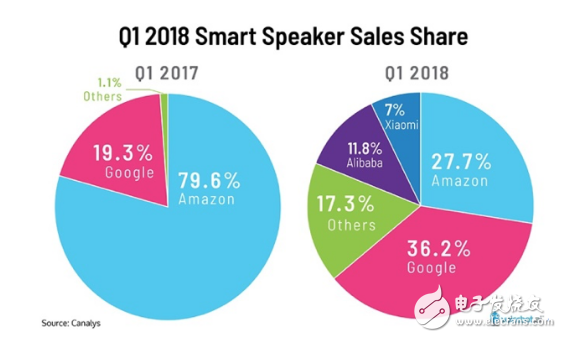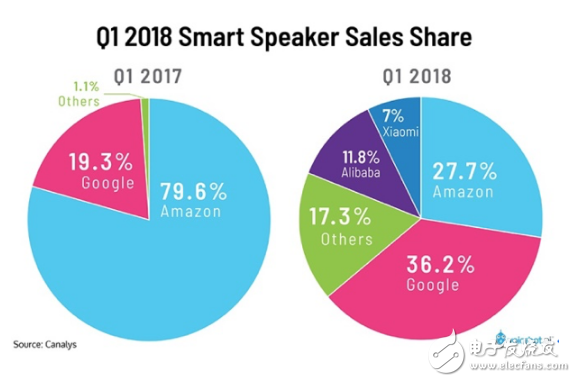In just 8 months, Baidu launched 3 smart speakers, the speed is really amazing. The price of Baidu speakers is much lower than that of its competitors. It does not consider profit or cost, and wants to gain a foothold in the smart speaker market.
Baidu just launched Xiaodu, the price is only 89 yuan, the retail price of this speaker is 249 yuan, and now the early adopter price given by Baidu is only 89 yuan, which is much lower. Of course, by looking at the price, you know that this is an entry-level speaker. Baidu uses AI technology to label music with more than 7000 labels, which can adapt to different scenarios and moods. Compared with the products of Xiaomi, Alibaba, JD.com, and Cheetah, Baidu Smart The speakers are the cheapest.

Low price is king
Xiaodu smart speakers are driven by AI technology, and Jing Kun, general manager of Baidu's Smart Life Division (SLG), declared that smart speakers can be individualized within 30 days of use. He also said: "The longer you use Xiaodu, the better it can understand you."
Smart speakers have become a big industry with a global market size of $14.7 billion. It is dominated by Amazon Alex and Echo, Google Home, and Apple HomePod, but this market belongs to the "English-speaking world." As for the Chinese market, no one dares to say that he is a leader. There are more than 100 companies competing and all want to be guides.
In order to enter the smart speaker market, Baidu acquired the Beijing startup Raven Technology, and launched the Raven H smart speaker last November, priced at 1,699 yuan. The price is really expensive, equivalent to 3 times that of Alibaba's smart speakers and 4 times that of Xiaomi's smart speakers. Some media reported that this speaker is not selling well, with sales of less than 10,000 units.
Baidu told some engineers not to develop this speaker anymore. Within the team, everyone also has differences. Some people think that it should be aimed at the high-end market, and some people think that it should launch mass products. There are rumors that Jesse Lyu, the founder of Raven, will leave the company. Baidu declined to comment.
In March, Robin Li launched a mid-range smart speaker called Xiaodu at Home, priced at 599 yuan.
The newly launched $89 speaker supports the "child mode", which can communicate with children, and the "Geek" mode, which can complete continuous conversations. There is no need to say the wake-up word every time when inquiring.

Cooperation with home appliance companies?
According to Sun Mengqi, an analyst at Bank of Communication InternaTIonal Holdings, the key to the success of smart devices lies in the depth and breadth of the product content library.
Sun Mengqi said: "Smart speakers must meet the needs of users. Most people use speakers to listen to music and use Tmall Genie to help them buy things. If the product has a better content source, it will have an advantage. Can Baidu get home appliance developers? We have to wait and see to turn our smart speakers into a home control center."
Jing Kun said that Baidu has cooperated with Haier to control home appliances with Baidu smart speakers. It has also established a similar partnership with Skyworth. How much does Baidu lose for every product sold? Jing Kun did not want to disclose, he just emphasized that until the company can't afford it, it will continue to provide subsidies and sell at low prices.
For the moment, almost all mainstream Internet companies are selling AI speakers at a loss, with a simple purpose, just to attract more consumers to use the product.
The prices of JD, Alibaba, and Xiaomi smart speakers were initially set at 169-299 yuan, but the actual prices are all below 100 yuan.

Lessons of failure
Through the Raven H smart speaker, Baidu has learned an important lesson: China does not have a large enough market to support the development of high-priced speakers. The failure of Raven H may only be caused by its inconsistency with Baidu's corporate strategy.
Raven H is priced at 1699 yuan, which is the same as Apple HomePod (Apple HomePod is not officially launched in China), far surpassing Amazon Echo (also not launched in China). The price of Alibaba Wizard is 499 yuan, which is far from each other.
When it came to a discount, the price of the wizard dropped to 99 yuan. The list price of Xiaomi smart speakers is lower, as long as 199 yuan or 299 yuan. Because of the low prices, Alibaba and Xiaomi smart speakers have the highest share in the Chinese market, but they still only rank third and fourth in the global market, lagging behind Amazon and Google.
Baidu wants cheap, mass-market products, but Lu Cheng, the founder of Raven, is a believer of Jobs. He wants to develop high-quality devices and wants to develop a "decisive product" like the iPhone that will eventually replace mobile phones. Because Lu Cheng’s requirements were too high, Raven Technology continued to negotiate with the manufacturer to meet his high requirements, which resulted in repeated delays in production.
In desperation, Baidu Zhihao promoted Ainemo first, but at the time there were still people who believed that Raven H could succeed in the high-end market. In addition, Baidu is also advancing a new project: the development of low-cost smart speakers. Daiwa Capital Markets analyst John Choi believes: "In order to rule the market, Baidu needs a powerful smart speaker. This is very important. This is only the first step."

The status quo of smart speakers in Asia Pacific
IDC believes that although many companies have broken into the smart speaker market, the current products are mainly aimed at English users, and language has become the biggest obstacle to the popularization of smart speakers in Asia. Even if Asians speak English, there are many slang terms in different regions due to different accents, so it is difficult for digital assistants to deal with it.
Amazon and Google have improved their digital assistants. They regard India, Australia and other regions as growth areas, and when targeting these countries, they will optimize for local accents. If users speak Korean or Chinese, local companies have an advantage. In South Korea, Kakao is in the leading position, and Baidu in China has localized digital assistants. These companies have many applications, which are very popular in their own countries, and they have the ability to develop AI assistants that can understand the local dialect.
Language aside, when smart speakers are promoted in Asia, the lack of application and practicability are also two key obstacles. There are not enough applications in the entire ecosystem to support the development of digital assistants.
For the moment, in Asia, the growth momentum of smart home devices mainly comes from home appliances. Users can control and monitor devices through smart phone mobile applications, instead of using digital assistants. But in the next few years, this situation may change because of the rapid advancement of AI technology.
Perhaps it is to see this trend that Baidu will cooperate with home appliance companies to enhance the practicality of smart speakers.
Motor Three-Phase A.C Induction,Ac Motor Electric Motor Induction Motor,Electric Motor Centrifugal Pump,Electric Motor Centrifugal Switch Gear
Ningbo Zhenhai Rongda Electrical Appliance Co., Ltd. , https://www.centrifugalswitch.com